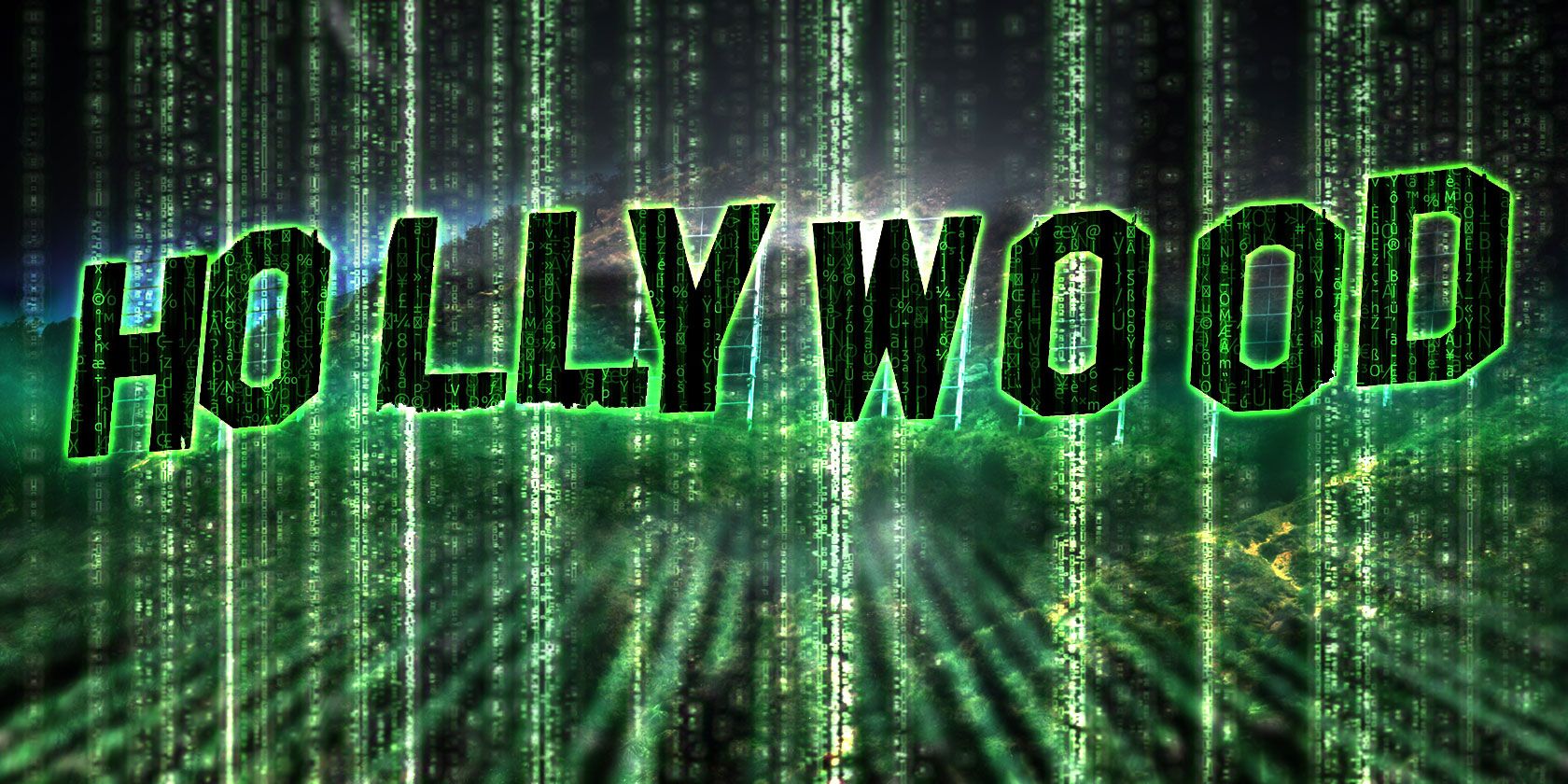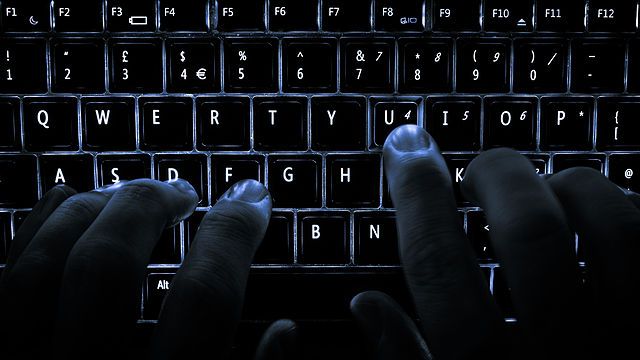Hollywood and hacking do not get along.
Real-life hacking is hard, tedious, slow work. It's 10 seconds of payoff after weeks of testing and experimenting. Meanwhile, movie hacking is pretty much just burbling gibberish while pounding away on a keyboard like your fingers are going out of style.
I myself am not a hacker, but my college roommate was, and I picked up an interest in hacking through osmosis. I've participated in CSAW, and other computer security competitions. I've taken classes that included buffer overflow exploitation as homework. I'm not claiming to be an expert, but I do know just enough about it that watching NCIS causes blood to come out of my eyes.
Unfortunately, most Hollywood portrayals of computers and hacking are painfully bad. That's a shame, because the few counter-examples show that hacking done well can be genuinely cool. On the flip side, sometimes the hacking is so goofy that it crosses the line into comedy. For your enjoyment, we've collected the most notable examples of both. Whether it's good, bad, or so bad it becomes good, we've got it all below.
The Best Movie Hacking
The Social Network
The Social Network, created by Fight Club director David Fincher, tells the story of the rise of Mark Zuckerberg and the creation of Facebook. It's a great movie, and one that does a uniquely good job of dealing with computers in a stylish but realistic way.
The Social Network is a weird movie to watch if you know programmers. The technical side of the movie is flawless. Literally everything Zuckerberg says in the scene above makes sense, and it's the most realistic portrayal of modern hacking I've ever seen. That said, the dialog has clearly been filtered through a writer who's never met a programmer, which makes the jargon come across as slightly off.
Mark Zuckerberg personally objected to the coolness of his character, saying:
“My goal was never to make Facebook cool. I’m not a cool person, and I’ve never really tried to be cool. Our goal isn’t necessarily to make it particularly exciting to use; we want to make it useful.”
Regardless, The Social Network is a great film, and a great example of how to make hacking interesting, without resorting to crazy animations or shouted technobabble.
WarGames
WarGames, the 1980s movie where young Matthew Broderick plays computer games with a military AI, is not where you'd expect to find a lot of technical accuracy. However, you'd be wrong. While dated, WarGames is an amazingly accurate portrayal of hacking ("phreaking") in the early 80s.
Early in the film, the protagonist (David) wants to hack into the school to change his grades. He does this by peeking at the sticky note where the teachers keep the mainframe password. Later, he uses a real exploit in period payphones to make a free call.
Somebody did a ridiculous amount of homework for this movie, and it shows. Aside from the military AI, basically everything shown in the movie is real. Ignoring how dated it is, WarGames might be the most accurate cinematic portrayal of hacking of all time.
Blackhat
Blackhat, a recent film starring Chris Hemsworth (AKA Thor), follows a joint Chinese-American task force investigating a series of incidents of cyberterrorism. The protagonist is a former hacker who is saved from a 15-year sentence to consult on the effort.
The filmmakers clearly did their research, and the result is a remarkably accurate portrayal of modern hacking and cyberterrorism. The virus which is used in the initial attack on a nuclear plant bears a striking resemblance to Stuxnet, a real virus which was used to attack Iranian centrifuges.
Though there are a few silly moments, the film largely does a pretty good job of portraying computer usage as a whole. Every time the camera shows a screen, the contents are pretty believable. The characters use Bash, Emacs, and Linux, and, while there are some visualizations of following code execution through a CPU, they're pretty subdued compared to some of the movies on this list.
Blackhat departs from reality a little in terms of its plot, which is Rube Goldebergian in nature and tends to devolve into Hollywood cliches. Hemsworth's character also gets into a lot more gunfights than real computer security consultants do, and winds up half-shirtless more than you might reasonably expect.
That all being said, the movie does an excellent job on the technical side of things, and most of the attacks in the film are pretty plausible, with social engineering, air-gap attacks over USB drives, and a keylogger carried in a PDF all being shown.
Office Space
Office Space, the classic Mike Judge comedy about suburban middle-class hell, is a fantastic movie, but most people wouldn't think of it as a movie about hacking. The fact that Office Space makes the "Best" list is a good indication of just how few movies portray hacking well. Office Space uses hacking only as a relatively minor plot device. Still, I think Office Space deserves a spot on the list - not so much for what it does, as for what it doesn't so.
There's a sequence in the movie where characters plant a virus on a company computer. The scene is tense, and accurately conveys what's going on, and does so using no technobabble or CG. The movie doesn't go into enough detail to get anything wrong. If your movie isn't primarily about technology, that's exactly the right way to do it.
The Worst Movie Hacking
Hackers
Hackers is notable for being maybe the least accurate portrayal of hacking of all time. The technobabble is gibberish, and every time a character touches a keyboard, an 80s CG acid trip ensues. This movie is ridiculous.
That said, despite its many failings, the film does a really good job of capturing some elements of hacker culture. Maybe it was prescient, or maybe it was so iconic that it shaped hacker culture in its own image. Either way, you can't help but feel like the characters are real hackers. Or, at least, they're who real hackers aspire to be.
Live Free or Die Hard
When franchises go on for too long, it's often the third film where it all falls apart. Alien 3, Shrek 3, Terminator 3. The Die Hard franchise managed to hold on a little longer, getting out three decent films. Then it all got a little weird. It's not even that Live Free or Die Hard is a bad movie - it's just that the world was not ready for a Die Hard that included Justin Long as a main character.
The villains in Live Free or Die Hard are computer hackers - which, in this movie, is pretty much the same thing as "wizard". The hackers can hack traffic lights, the stock market, cellphones, bank accounts, military jets - and, in one memorable scene, the abstract concept of fire.
Hacking, in the Die Hard universe, is basically just necromancy for electronic devices. It's absurd, but I think this is an example that crosses the line into the genuinely enjoyable.
Swordfish
(Video is NSFW)
Making a list of the best hacking in films is challenging because of how few good examples there are. Making a list of bad hacking is hard for the opposite reason. There are so many examples that it's hard to decide what should make the list.
The hacking and technobabble in Swordfish is bad, but it isn't remarkable. The reason that the film makes the list is almost exclusively for the scene above, where a hacker is forced to hack the pentagon with a gun to his head, and monkey business going on under the desk. The sheer absurdity of this scene will live forever in the annals of bad movie history.
Skyfall
The hacking in Skyfall is notable because of how much work the creators put in to doing it wrong. Skyfall's hacking is beautifully, elaborately executed, garbage.
Hacking has a big role in Skyfall, because it ties into the theme of the old world being replaced by the new world. The film squares off an aging Bond and the human intelligence that he represents against cyber-terrorism, and younger, more tech-savvy agents.
The villain, Raoul Silva, is a hacker who attacks Britain for revenge against his old boss. At various points, Silva uses hacking to blow up buildings, escape from prison, and make viral videos. The visualizations used to portray these things are beautiful and also total nonsense.
Consider the scene above: what's actually happening there (a piece of evidence retrieved for analysis turned out to have a malicious payload) is reasonable. But the way it's portrayed is absurd. The code analysis tool shown on the screen is neat looking, but useless; and that's before it inexplicably morphs into a subway diagram. The technobabble includes real words, but the sentences mostly don't mean anything. Clearly, they had competent technical advisers on staff, but chose to completely ignore them.
Hacking Into the Future
There is some light at the end of the tunnel. As computers become more ubiquitous, audiences are getting savvier, and portrayals of computer usage are getting better. As the insightful video above points out, much of Hollywood's initial portrayals of technology were painfully awkward. Since then, we've slowly been developing conventions to deal with them.
Hollywood's portrayal of hacking is also improving, slowly.
House of Cards' portrayal of computer security isn't great, but it is better than it would have been 10 years ago. Concepts like encryption and proxies and digital signatures are starting to penetrate the popular consciousness. Not just out of popular interest, but out of necessity - as more and more of our lives are lived online, people have to be more and more aware of the dangers posed by hackers and malware.
As television executives notice that computer security is becoming a part of daily life, we should continue to see better and more accurate representations of what's involved. It's important that films get this right, because it's more and more relevant to the lives of their audience.
What do you think: Do you actually care about the accuracy of hacking in movies? Or is actually not that important in the grand scheme of things? Did we miss a great example of either good hacking or bad hacking? Please let us know in the comments section below!
Image Credits: "Hacker" by WikiMedia


